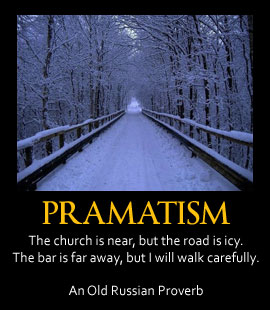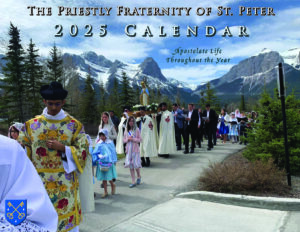Pragmatism by D.Q. McInerny, Ph.D.
 (From the August 2009 Fraternity Newsletter)
(From the August 2009 Fraternity Newsletter)
Most of us would be prepared, I suspect, to see something to admire in what was presented to us as a pragmatic approach to life, that is, the kind of approach taken by someone who has a clear-eyed sense of a job to be done, a goal to be reached, and then forthrightly chooses the most efficient means to do that job or reach that goal. By and large, we are inclined to praise those we regard as practical people, whereas the adjective “impractical” is almost never applied by way of a compliment. Impractical people might make nice company in relaxed social situations—because, say, they are witty, or sprightly conversationalists, or good listeners—but we would be reluctant to pick them as our helpers in the kitchen or workshop.
Of course, it’s a bit simplistic to suggest that the world can be neatly divided into practical and impractical people, as if a person were purely the one or the other. Most of us are admixtures of both the practical and the impractical, and which of these two dimensions of our personalities might come to the fore varies over time. We have our good days, when we match means to ends with a facility which might surprise even ourselves, accomplishing all sorts of things with the greatest of ease. Then there are those days when we seem to be all thumbs, and none of our projects are brought to completion, or, if they are, only in a droopy, unimpressive way.
Could we say that pragmatism, or practicality, is a virtue? Well, not just as such, but we could regard it as an element of the virtue of prudence, that queen of the moral virtues which is our sure guide in leading us to what is truly good for our total welfare as rational creatures made in the image and likeness of God. If the heart of practicality is choosing the most efficient means to attain an end, then whether or not the exercise of our practicality in any given instance is worthy of praise would all depend upon the moral quality of the end we are pursuing, as well as on the moral quality of the means we employ to achieve that end. And there is the critically important point, a point which, unfortunately, would seem to be lost on many people today. We live at a time when expediency rules, sometimes an expediency of the crudest kind. I speak of an attitude that systematically ignores the moral quality of ends and means, and blindly exercises a practicality which is thoroughly barren because it is completely at odds with virtue. Let us state the case plainly: there is no merit in being practical if our practicality is not in the service of the good.
Americans tend to pride themselves on being a practical people, and I suppose in certain respects there is some justification for considering ourselves to be such, for better or for worse. But whether Americans are more practical than any other people you could name—the Chinese, for example—is an arguable point. What isn’t arguable is the noteworthy fact that Americans have provided the world with a distinct theoretical articulation of the pragmatic approach to life, taking the form of the one philosophy which is indigenous to this country, a philosophy which is called, fittingly enough, pragmatism. The three American philosophers whose names are most closely associated with this philosophy are Charles Sanders Peirce (1839–1914), William James (1842–1910), and John Dewey (1859–1952). Pragmatism, in not a few of its features, is an interesting philosophy, and it has some positive aspects to it. It is also, in my opinion, a philosophy which is quite revealing of the general tone of the culture of the country from which it emerged. But, taken as a whole, that is, as a philosophy, pragmatism is fatally flawed. In fact, it can be called a false philosophy.
Why does it deserve so harsh an indictment? Because of its profound confusion over something which is of the greatest consequence, something which it should be the principal business of philosophy to be as clear as possible about—the truth. Considered in the broadest and most fundamental terms, the truth can be understood simply as what is, objective reality, the way things actually are, which the human mind, if it is functioning correctly, strives at every turn to be measured by. The egregious mistake made by pragmatism is to regard truth as simply what works. Truth ceases to be something which is firmly grounded in the objective order, the standard by which the human mind is shaped and directed, and is reduced to a purely functional status. Most importantly, truth, for the pragmatist, is an essentially subjective phenomenon. The idea that there is the truth goes by the board. Truth becomes fluid, ever subject to change, for what worked yesterday may not work today, and tomorrow’s truth will very likely render today’s truth obsolete. Given the subjectivism which underlies the pragmatic understanding of truth, the door is then flung wide open to relativism. What works for you in the moral realm may not work for me, and vice versa, and thus we no longer live in a unified, coherent ethical universe. We do not have a shared moral language.
The attitude toward truth promoted and fostered by philosophical pragmatism is prevalent, if not dominant, today, especially in the political domain, and this is the case not only in America but in Western culture in general, and beyond. We have become pragmatists in the worst possible sense. We forge ahead in madcap fashion to implement plans and policies regardless of their moral quality. The only consideration is, Will they work? Will they be effective in bringing about the changes we want to bring about? This is bankrupt practicality; this is practicality gone berserk. The fact that moral questions are seldom raised, or, seemingly, even entertained, shows the depth and seriousness of our moral obtuseness, not to say degradation. Our mindless pragmatism has succeeded in effectively de-humanizing us. We have become a very efficient people—we can murder babies by the millions, and with the most up-to-date procedures—but we have managed to lose our souls in the process, for we have set our faces against the truth. But the truth will not be trifled with. We may delude ourselves into thinking that we can reconstitute reality according to our own tragically impoverished specifications, but it is always the case that reality, not man’s lying version of it, will triumph in the end. And as history has often shown, when truth eventually triumphs, it crushes those who sought to abuse it.
August 9, 2009








